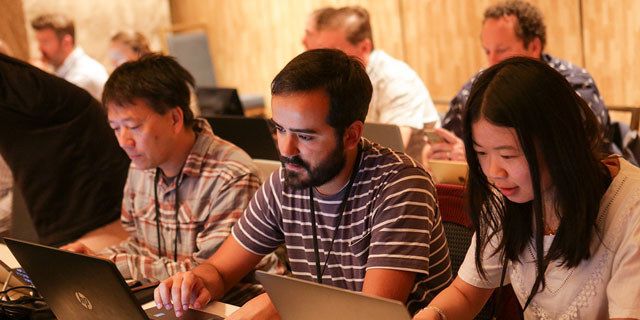In-Person Training
Deep learning with TensorFlow

Tuesday, September 4 through Wednesday, September 5
What you'll learn, and how you can apply it
- Understand TensorFlow’s strengths for machine learning and how TensorFlow can help with AI problems like object recognition and text processing
- Learn how to build a basic computation within TensorFlow, using Python
Prerequisites:
- Familiarity with Python, matrices, modeling, and statistics
- No experience with TensorFlow required
Hardware and/or installation requirements:
- A laptop (You'll be provisioned with a cloud instance with TensorFlow.)
Many of the deep learning algorithms used in AI applications are powered by large matrix operations. TensorFlow provides dataflow graphs for such operations, allowing algorithms to be easily parallelized across multiple processors or machines. This makes TensorFlow an ideal environment for implementing neural networks and other deep learning algorithms.
Robert Schroll offers an overview of the TensorFlow graph using its Python API. You’ll start with simple machine learning algorithms and move on to implementing neural networks, including convolutional neural networks to provide object recognition for machine vision, recurrent neural networks, including long short-term memory architectures, that allow the comprehension of time series and language, and generative networks, which give AI applications the ability to create output. Along the way, Robert covers several real-world deep learning applications, including machine vision, text processing, and generative networks.
Outline
Day 1:
- Introduction to TensorFlow
- Iterative algorithms
- Machine learning
- Basic neural networks
Day 2:
- Deep neural networks
- Variational auto-encoders
- Convolutional neural networks
- Adversarial noise
- DeepDream
- Recurrent neural networks
About your instructor

Robert Schroll is a data scientist in residence at the Data Incubator. Previously, he held postdocs in Amherst, Massachusetts, and Santiago, Chile, where he realized that his favorite parts of his job were teaching and analyzing data. He made the switch to data science and has been at the Data Incubator since. Robert holds a PhD in physics from the University of Chicago.
Conference registration
Get the Platinum pass or the Training pass to add this course to your package.
Comments on this page are now closed.
Sponsorship Opportunities
For exhibition and sponsorship opportunities, email aisponsorships@oreilly.com
Partner Opportunities
For information on trade opportunities with O'Reilly conferences, email partners@oreilly.com
Contact Us
View a complete list of AI contacts
©2018, O'Reilly Media, Inc. • (800) 889-8969 or (707) 827-7019 • Monday-Friday 7:30am-5pm PT • All trademarks and registered trademarks appearing on oreilly.com are the property of their respective owners. • confreg@oreilly.com














Comments
Hi, I did not attend the training. However, i have seen this wonderful opportunity. Any materials will be shared? from this workshop. i really appreciate.
I am contemplating changing my registration to attend this training session instead of BigDL training. What is the format and content of Day 2? Will Day 2 be hand-on and include actual use cases, and corresponding datasets, for each algorithm listed above? Please clarify. thanks!